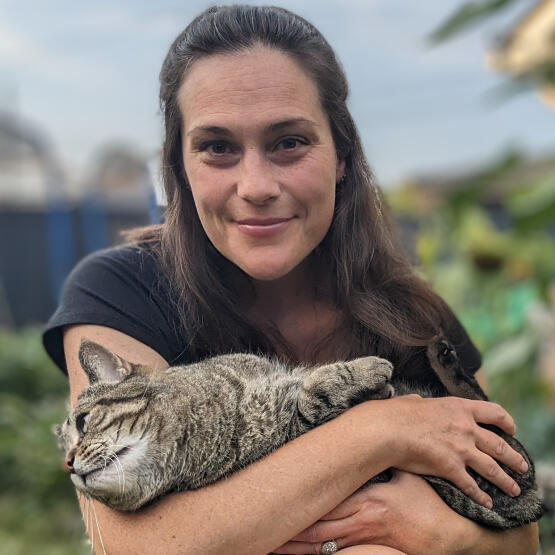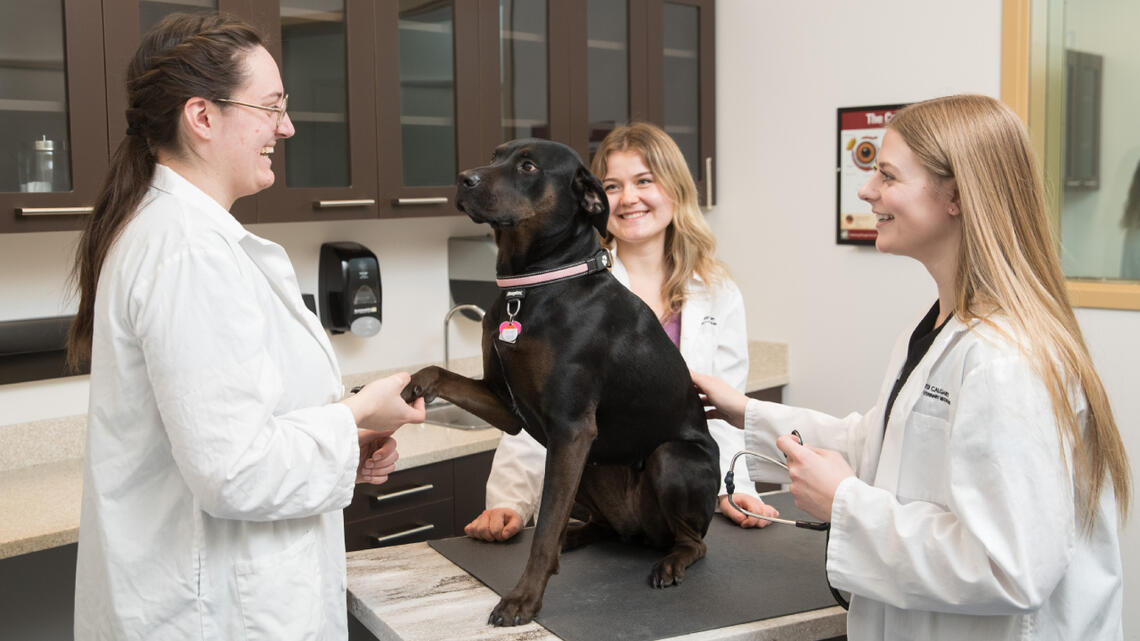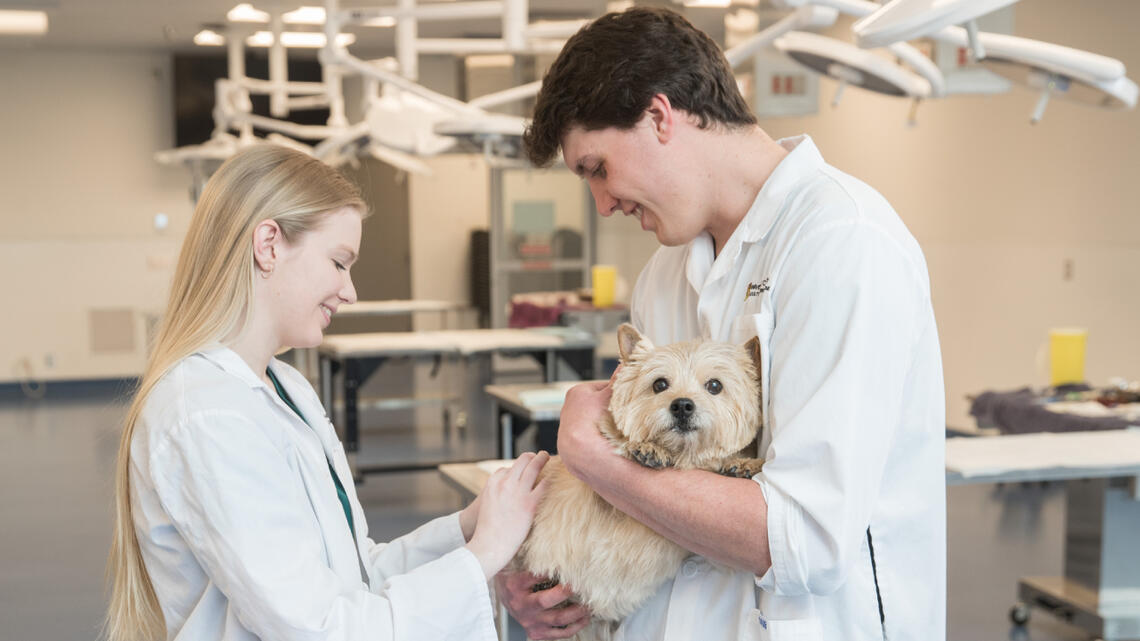
Sept. 9, 2024
Eight Things Your Pet Wishes You Knew
Whether it’s a beloved 160-lb St. Bernadoodle named Indiana Bones or a polydactyl kitten named Tito, our pets quickly become integral members of our families. However, understanding their health needs can be challenging. While they share many similarities with humans, diagnosing issues can be difficult without the ability to communicate directly, ala Dr. Dolittle.
Dr. Katherine Sparkman, an early alum of the University of Calgary’s Faculty of Veterinary Medicine (UCVM) and Alumni All-Access speaker, is dedicated to deciphering these messages. Sparkman, DVM’12, says her affinity for animals began in her Nova Scotia childhood, growing up surrounded by family pets that included hunting dogs, cats and even a snake. This early exposure allowed her to grow up seeing variety of animal behaviours first-hand, as well as seeing how animals should be properly cared for. Her initial interest in animals evolved into a commitment to ecology and eventually led her to veterinary medicine, culminating in her decision to attend UCVM.

Dr. Katherine Sparkman, DVM '12, with the family cat "Cricket".
Courtesy Dr. Katherine Sparkman
A New Chapter at UCalgary
When UCVM launched its four-year program in 2008, Sparkman recognized it as a unique chance to partake in a pioneering curriculum that promised a fresh approach to veterinary education. Motivated by the prospect of being part of a groundbreaking educational experience, she completed an ecology degree from Bishop's University in Quebec and later moved to Alberta to establish residency, applying to UCVM a year later.
“The school buildings weren’t technically built yet during our first year, but the curriculum was already established,” she says. “It was a thrilling experience to watch the school take shape around us.”
UCVM provided the perfect setting for Sparkman to meld her skills with her passion. The faculty, particularly in the realm of emergency and critical care, made a profound impact on her. “All of the professors were amazing,” she remembers, adding Dr. Soren Boysen, DVM, a professor noted for his expertise in emergency medicine, "made emergency medicine seem not just vital, but also intriguing and constantly evolving."
Beginning Her Veterinary Career
Following graduation, Sparkman worked as a substitute veterinarian at Western, a downtown emergency clinic, and with the Calgary Humane Society. These roles offered her a broad spectrum of experiences, from high-stakes emergency care to more-routine shelter medicine, laying a solid foundation for a diverse and rewarding career.
"The supportive community at UCalgary was instrumental in shaping my career," notes Sparkman. "From my professors to my peers, I was constantly surrounded by individuals who shared my passion for trying new things and pushed me to think critically about the health and well-being of pets." This supportive environment not only enhanced her educational experience but also solidified her commitment to veterinary medicine.
Her passion for the field led her to volunteer with the Alberta Spay and Neuter Task Force, an organization dedicated to combating pet overpopulation — a pressing issue in veterinary public health.
“Once you have a degree in vet-med, you can go into research, rural practice, equine medicine or work with large animals, small animals and public health” Sparkman explains. “I was excited about trying different things, which is why I enjoyed being a substitute vet for a while.”
“There's not much that I don't like about my job,” says Sparkman. "No two days are the same; there is always something new happening, which keeps it exciting. There's always a challenge with something new and fun to do."
Finding Her Niche
This exploration of different veterinary roles eventually led Sparkman to a small-animal primary care clinic, where she found her niche and spent the next nine and a half years.
“That’s when you really hone your skills,” she reflects, acknowledging how her role encompassed everything from medicine and surgery to client communication — an essential aspect of her job. “If you’re public-facing as a vet, client interaction is a huge part of your job. In government or research roles, maybe less so, but in primary care, it’s crucial.”
After nearly a decade at the clinic, Sparkman felt the need to seek new challenges and opportunities for growth. Today, she works at Alpine 24/7, a 24-hour emergency veterinary clinic. In this dynamic environment, she continues to apply her extensive skills, addressing urgent care needs and complex cases that come through her door at any hour.

The University of Calgary Faculty of Veterinary Medicine (UCVM) is one of only five veterinary schools in Canada.
UCalgary Faculty of Veterinary Medicine (UCVM)
A Holistic Approach to Veterinary Care
Sparkman’s educational journey not only prepared her academically, it also deepened her understanding of the pivotal role pets play in their owners' lives. "It isn’t just about the pet’s physical wellness. It’s about their emotional and mental well-being, too," she explains. "That’s why we focus on the whole picture — everything from diet and exercise to creating a stimulating environment that promotes happiness for pets."
This collaborative approach with pet owners ensures a comprehensive care model, leveraging her medical expertise alongside the intimate knowledge owners have of their pets.

Sparkman stresses that preventive care, including vaccinations, can prevent many common issues from developing into more severe problems down the road.
UCalgary Faculty of Veterinary Medicine
Eight Things Your Pet Wishes You Knew
Sparkman's insights into the nuances of pet health and behaviour underscore a vital aspect of pet care: understanding what our pets are trying to communicate.
Despite our best efforts, there are still many things that pets likely wish their owners knew — subtle signs and behaviours that could significantly improve their quality of life.
- Prioritize Preventive Care and Pay Attention to Your Pets
"One of the most important things you can do as a pet owner is to stay on top of routine check-ups,” says Sparkman. “Pets can’t tell us when they’re in pain or feeling unwell, so regular veterinary visits allow us to catch any potential health problems before they become serious."
Sparkman stresses that preventive care, including vaccinations, can prevent many common issues from developing into more severe problems down the road. Although she remains the expert, Sparkman encourages owners to actively participate in maintaining their pets' health.
“Generally speaking, pet owners know their animals better than I ever could because they live with them every day,” Sparkman asserts. “As a veterinarian, I might notice gradual changes like weight loss or fur loss, but owners are much quicker to detect shifts in their pets' patterns or behavior than I would be."
- Help Your Pet Have a Stress-Free Visit to the Vet
For first-time visits to a vet, especially by new pet owners or when changing providers after a move, Sparkman recommends requesting a preliminary meet-and-greet at the clinic.
"You can always call ahead to ask if your pet can come in to simply get acquainted with the clinic," she suggests. During this visit, there are no physical exams, vaccines or treatments — just an opportunity for your pet to explore the environment in a stress-free manner. They receive positive attention and treats, which helps associate the clinic with positive experiences rather than medical procedures. However, Sparkman cautions, this approach might not be suitable for all pets, such as those who dislike travelling. "For these pets, a house call from a veterinarian might be a better option," she says.
Either way, this strategy ensures the pet's first experience with veterinary care is as pleasant as possible, setting the stage for (hopefully) easier future appointments.
- Provide Your Pet with a Balanced Diet (and Some Treats!)
"A balanced diet is the cornerstone of good health for pets,” says Sparkman. “Understanding your pet’s nutritional needs can help prevent diseases like obesity and joint issues."
Sparkman advises pet owners to consult with their veterinarians to determine the best dietary plan for their pets, emphasizing the importance of not overfeeding them and limiting treats.
This doesn’t mean denying treats altogether. She recommends treats make up no more than 10 per cent of a pet's diet, with the regular diet comprising the other 90. Additionally, she suggests considering non-food rewards, such as petting, brushing or verbal praise. For cats, a scratch under the chin can also serve as a pleasant treat. These alternatives can be rewarding and help reinforce positive behaviour, without contributing to overfeeding.
- Provide Exercise and Mental Stimulation
Ensuring your pet has ample opportunity for activity — both indoors and out — is essential to keeping them healthy and mentally sharp.
"Just like humans, pets need physical and mental exercise to thrive," Sparkman explains. "Providing regular walks, playtime and even puzzle toys can keep your pet active and prevent boredom, which often leads to behavioural issues."
Sparkman says physical activity isn't the only way to stimulate pets; there are various non-physical activities that can also engage and entertain them effectively. For indoor pets that may not enjoy outdoor activities, she suggests alternative forms of stimulation such as playing with a favourite ball, carrying around a beloved stuffed toy or exploring a climbing tree. She also recommends interactive games and puzzles available at pet stores. Even the simple act like brushing can be soothing and beneficial, offering physical touch that is both comforting and stimulating for pets.

For first-time visits to a vet, especially by new pet owners or when changing providers after a move, Sparkman recommends requesting a preliminary meet-and-greet at the clinic
UCalgary Faculty of Veterinary Medicine
- Alternative Therapies Aren’t Just for TikTok
Sparkman recognizes the value of alternative therapies like acupuncture or pet physiotherapists, noting they can be quite beneficial when appropriately matched with the right patient and condition.
"But, like everything, there's a balance," she says. For example, in addition to conventional treatments like medication for a dog's leg injury, Sparkman would recommend low-impact exercises. "Maybe your pet would also benefit from something like the underwater treadmill or low-impact range of motion exercises or acupuncture," she states, highlighting how these can complement traditional pain-management strategies.
However, Sparkman advises caution with some alternative therapies: "It's maybe a little less-regulated than some other areas of veterinary medicine," she warns. Therefore, she stresses the importance of doing thorough research and ensuring trust in the practitioners providing these treatments.

Cats, generally speaking, want attention on their own terms,
Ryan Ohashi
6. Sometimes, Your Pet Just Needs Space
Dr. Sparkman emphasizes the importance of respecting a pet’s personal space, noting that, just like humans, animals have their own comfort zones and preferences for interaction.
“Cats, generally speaking, want attention on their own terms,” she points out, adding that pushing a pet too far can lead to defensive behaviours such as scratching or biting as a response to unwanted handling. “A cat is a cat … they will probably turn around and hiss at you or scratch you if they don’t want to be picked up and handled.”
Sparkman says animals often seek closeness on their terms. "Our cat, she comes in, she snuggles, she purrs and then she wants to sit next to you, but not on you,” Sparkman says. “She still wants to be in your proximity, but she has a little bubble around her." She says this also applies to dogs; some may prefer simply to be near their owner, rather than on their lap.
7. Make Sure You Are a Good Match
Just like every human has their own distinct personality, Sparkman says the same applies to breeds of pets and humorously stresses the importance of matching a breed's personality with your lifestyle when considering adoption, much like choosing a life partner.
"If someone wants to adopt a dog or a cat, make sure that they do their research on the breed’s personality," she advises, highlighting that, while all pets may appear adorable at first, living with them daily requires compatibility.
"(The pet’s) personality should match what you're looking for, same as if you were to choose a partner to spend your life with you,” says Sparkman. “Some people choose based just on looks, but, ultimately, you want a personality, right?"
- Remember, it’s a Responsibility
Sparkman underscores the commitment required in pet ownership, reminding prospective pet owners of the responsibilities that accompany bringing an animal into their home.
"There is a responsibility with pet ownership, whether you adopt a dog, a cat, or even a smaller pet like a hamster or guinea pig. You are responsible for their well-being," she says.
This includes ensuring they receive proper medical care, as well as consistent access to food and water, ample exercise and a safe shelter. By highlighting these responsibilities, Sparkman aims to ensure that individuals are fully aware of what it takes to provide a healthy and happy environment for their pets, reinforcing the importance of thoughtful and prepared pet ownership.
Have more questions? Our team of expert vets is ready to dig in - from the basics of pet health care to how to go about launching an exciting career with animals. Delve into the world of vet-med at a Alumni All-Access virtual session on October 18th titled Dig In! to Animal Care & Vet Adventures with leading experts including Dr. Sparkman; Dr. Doug Whiteside, DVM, DVSc, a UCalgary Faculty of Veterinary Medicine (UCVM) associate professor who is also the head veterinarian and senior manager at the Wilder Institute/Calgary Zoo. “Dr. Doug” will be joined by Dr. Dayna Goldsmith, BSc’10, DVM’13, a veterinary anatomic pathologist and UCVM instructor; and Dr. Scott Zaari, DVM’13, director of Veterinarians Without Borders. The event will be moderated by Dr. Rebecca Archer, BSc’03, DVM, UCVM’s associate dean.
